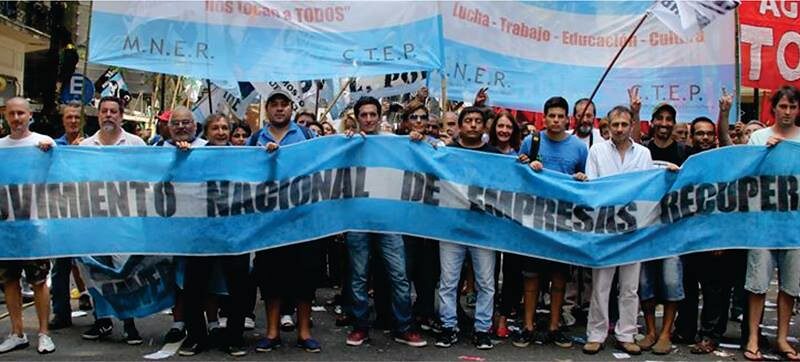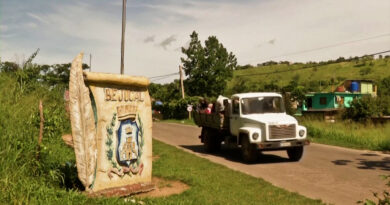The Argentine model of companies recovered by their workers
CECILIA VALDEZ
The memory of December 2001 in Argentina refers, almost automatically, to the corralito. However, at the same time that the banks were leaking massive sums of money; the former president, Fernando de la Rúa, was leaving the government house by helicopter in the midst of an unprecedented economic crisis; and there was atrocious repression against a people that had taken to the streets to demonstrate; some of the most important experiences of popular organization that can be accounted for in Argentine history were also cooked up.
Neighborhood assemblies, barter, unemployed movements, cartoneros, or companies recovered by their workers, began to form part of the daily landscape and managed to insert dynamics of massive and unprecedented grassroots organization until then. Some of them, like the recovered companies, persist, grow and have just completed 25 years adding experiences.
On May 22, 1998 -the date stipulated as the day of the workers of recovered companies-, coincides with the beginning of IMPA (Industrias Metalúrgicas y Plásticas Argentinas), which laid the foundations for the creation of the National Movement of Recovered Companies. (MNER), in 2001. Like so many other companies of the time, IMPA faced, and overcame, the emptying of the factory, forming a cooperative and changing the laws of the game. Hundreds of workers were the ones who received layoff telegrams at that time and, many others, who decided to take over the factories, organize and fight for the expropriation, and many managed to sustain themselves over time.
The map of the website of the National Institute of Associations and Social Economy (INAES), which depends on the national government, has a National Registry of Recovered Companies (ReNacER), which shows the variety of items covered by these companies, headed by metallurgical, food, textile and graphics, but which also includes the first pharmaceutical laboratory in the world to be recovered by its workers: Farmacoop.
Under the slogan "Occupy, Resist, Produce", the IMPA workers gave battle, and the initial kick of what later became a model to follow. The occupation, the soup kitchens and the strike funds were (and are) part of the action mechanisms that were put in place to keep the factory and the machines running, since the owners ordered the closure.
Occupation
Grissinopoli, a factory located in the Chacarita neighborhood (Buenos Aires), dedicated to the production of breadsticks (breadsticks), was one of the many cases in which, based on a series of fraudulent measures, the owners tried to empty of the company
"This began to decline after a series of negotiations that the owners made at the end of 98," said Norma, a factory worker, a few months after they had been able to form a cooperative in 2003.
“It turns out that Carrefour ordered a million sweet breads and, since we couldn't keep up, they made us pack them hot and they were all crushed. We delivered them, and on January 6 they returned half, that was an impressive waste of money. Afterwards, one of the managers had us prepare a special shipment of breadsticks in boxes, which he took to Miami and never returned.”
In this way, Norma exposes some of the disorders that almost led them to have to start over, but also the gestures that restored some dignity in the midst of the confusion: the help came from a neighbor in the neighborhood.
“One night we were meeting and an assemblyman from Palermo Viejo (a neighborhood near Chacarita) fell, asked us how much we needed to make a first production, and told us that he was going to talk to his partners and give us the money. Said and done, the next day, at seven in the morning, he was there with the money. In a week we were able to return what he had lent us and continue producing ”.
At the point of the takeover, the workers have already had to go through the same claims countless times: wages owed for months, or for years, no contribution of any kind, and threats of layoffs or reduced hours. For this reason, one of the issues most highlighted by the workers is how significantly important the response of the neighborhood and the community is, once the occupations of the factories have taken place. A large part of the support actions of these movements were possible thanks to the neighbors, university students, or different members of the community, who put together strike funds that allowed them to survive until the plants were put back into operation.
Today
Although it is a phenomenon whose first antecedents (post-dictatorship) were recorded in the early 90s, the massive recovery of factories occurred after the events of December 19 and 20, 2001, when the government of De la Rúa fell. It is estimated that, at present, there are more than 400 productive units recovered throughout the country, which employ some 18.000 people. The registry also made it possible to detect that the metallurgical sector, which had been very strong in the first recoveries around the year 2000, gradually diversified, and that in these 25 years the participation of women in work cooperatives has grown.
"Today there is still a growth in factories that are still linked to company bankruptcy processes," says Alexandre Roig, president of INAES. "As the years go by, what also grows is the knowledge of the workers, in the sense of knowing how to recover a factory and preserve their sources of work."
For Roig, the dispute always has to do with the possibility of resolving the underlying conflicts around the debts. “When there is a bankruptcy, there are four types of debts and the big issue is the hierarchy between those debts. In general, when companies are liquidated, the bank is privileged, then the suppliers, then the State, and, finally, the workers. The great challenge is to reverse that hierarchy, and that the workers are the first creditors of a bankruptcy. That not only protects labor and workers, but is also a great way to regulate the fraudulent use of bankruptcy. We must not forget that there are those who use bankruptcy to get rich.”
In 2020, in the midst of the pandemic, the National Movement of Recovered Companies (MNER), under the direction of Enrique "el Vasco" Murúa, presented a first draft of the National Law for the Recovery of Productive Units, and in 2022 the registration was given impetus (ReNacER) and a new bill.
Gisela Bustos is a lawyer, director of the Promotion and Evaluation of Projects at INAES, and is part of the MNER and the Cooperativa 19 de Diciembre, a former auto parts manufacturer from Isaaco. On December 19, 2002, the former Isaco went bankrupt, the workers took over the factory, supported themselves by the neighborhood and the neighbors, and received advice from the MNER to form the current cooperative. Over time the factory recovered and, in addition to producing auto parts, a popular high school was created, which issues official degrees and is attended by girls and boys from the neighborhood. For the workers, the baccalaureate was a way to give back to the neighborhood how much it gave them during that complex recovery process.
The law
"25 years have passed, we have been able to advance in conjunctural public policies, but strategic recognition is still lacking,” says Bustos.
“Some factories have expropriation for a certain time, but once that period expires we fall back into a vacuum. We continue to fight for a Law for the Recovery of Productive Units. We presented the last project on May 5, 2022 in the National Congress, with the aim that the recovered companies are expropriated by the State, and that the property does not pass into the hands of the cooperative, but remains in the hands of the State and be given to the cooperative on loan. We understand that this is maturing and is already imposing itself as a reality that must be addressed. We do not want private property, in the project what we are proposing is that this new subject be protected, which allows, neither more nor less, to sustain and generate jobs.”
Bustos is part of both the more institutional leg and the activism, and has a long history of fighting on the issue that makes her suspicious of the lack of answers.
“I think it has to do with the fact that the recovered companies put in tension some fibers that are key to the system. This is a system that is based, above all, on private ownership of the means of production. So, it shouldn't be nice to have to admit that it is possible for the means of production to be self-managed by their workers, something that until now was assumed to be unfeasible. We have shown that this is not the case, but it is not the case as long as the State also plays a present and virtuous role in sustaining this type of experience.”
Crisis
In times of crisis, factories had to reinvent themselves to survive. Without going any further, in the world crisis of 2008-2009, when the automobile industry fell, the December 19 cooperative began to manufacture magnetic clamps with recycled material, which were a success and which they continue to produce. Also, and since the State could not buy auto parts from them, they made garbage cans, posters and some pieces for the construction of houses. However, when the Ministry of Security proposed to them to manufacture bullet casings for the security forces, the assembly rejected it. Although the cooperatives have their boards of directors, decisions are made in assembly.
Bustos maintains that the recovered companies have a low mortality rate, and that this is linked to the fact that the brutal crises that Argentina is going through "did not translate linearly into destroying recovered companies, as happened with the private ones, and that this happens because The main thing here is not profit. He has to do with the fact that no one is saved alone, that is, if there is a crisis, an adjustment, or whatever, the hours are distributed in solidarity, but no one is left out; and with the link with the community, the recovered companies became a beacon of organization and articulation for the neighborhood.”
25 years
On May 22, the Lavallol Metallurgical Work Cooperative (COTRAMEL), former Canale, made headlines because President Alberto Fernández decided to commemorate the 25th anniversary of the workers of recovered companies, in its facilities. On October 30, 2018, just 20 years after the start of the movement, and under the government of Mauricio Macri, the workers of this tin and canned factory received the dismissal telegrams and immediately went out to defend their jobs. following the usual path: they camped out at the company gate for four months, for thirteen they did not receive wages nor were they able to make productions, and 35 people had to go out to tour the classrooms of the University of Lomas de Zamora to ask for help, chat with the neighbors and organize the sale of food to create a fighting fund.
Although the company's situation was finally defined in 2018, the problems began in the mid-'90s, when Canale was sold to Sociedades Macri (SocMa), one of the most important business groups in Argentina, of which the former president is a part. Mauricio Macri. After a decade of expansion and growth, mistakes led to underpayments and overproduction, and the company began to divest its food producers. During the camp, the proposal to set up the cooperative came up, and it was decided that this was the best way out. In this case, the workers also do not hesitate to recognize the enormous support network that allowed them to take the step. In the same way as at the beginning of the 2000s, the neighbors always appear as a central actor in this whole framework.
From the initial 5 tons of November 2019, COTRAMEL went on to produce 150 tons of tin containers, and plans to manufacture one million per month. In the act last May, Fernández assured that "today, the factory is at 20% of what it is capable of producing."
During the visit, the workers raised the need to move forward with the files of the law, and he replied that he is taking care of the issue. The president also maintained that if the factory "had its full potential in operation, that would help put an end to the concentration of the tinplate and can production market that exists in Argentina", and that, with another production capacity, and more supply, "entrepreneurs who need to pack would get better prices".
“Today's world has a very perverse capitalism, more concerned with finance than with production. The capitalism concerned with producing was a capitalism that served society because it provided employment. Due to the way in which capitalism involuted, a new form of economy has been born, which is the popular economy. It has come to stay, so we must give a framework of recognition to that economy and give a production framework to those who work in it,” said Fernández.
The workers also explained to him the need for some type of law to be enacted that allows them to be calm, without the threat of auctions or evictions, until the underlying issues are resolved.
“This situation of uncertainty has a serious impact on the community, on families, and on each of our colleagues. The legal vacuum leaves us helpless”, affirms Bustos.
Community
Both from her thesis and from her current job at INAES, Bustos has compared experiences in other parts of the world.
“We understand that the development of this experience in Argentina is quite unique in quantitative and qualitative terms. In quantitative terms, because we have not found in other countries a development in the proportion that the experience of our country has, and in qualitative terms, because there are their own characteristics that are imposed mainly in the experiences that are developed here that are not present in the cases that we were able to study in other countries”.
The recovered factories are not only recovered as productive units that support jobs, but also try to transcend those limits, and recover community spaces.
"This, which may seem like a utopian or romantic idea, I can assure you that it is based on concrete facts, and comes from practice, from going through and relieving different cases," explains Bustos.
“It is no coincidence that, in many of the recovered companies, there is also a popular high school, a popular library or a care space for children. This is the result of a nature with very deep characteristics that are very particular to the experience of our country. And I think it is a central factor in the sustainability of these experiences.”













